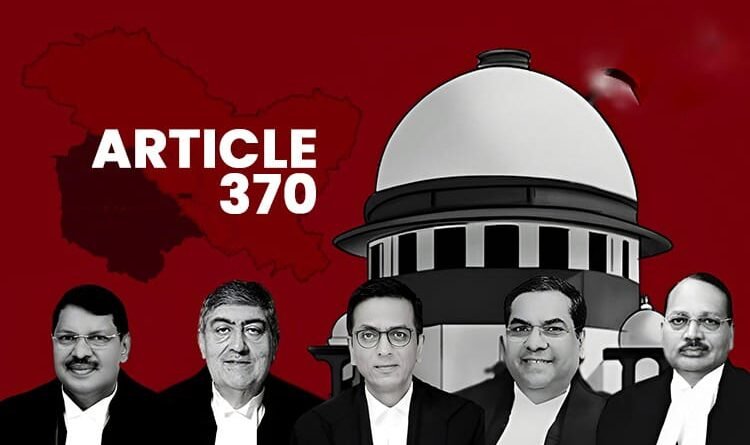SC Upholds Abrogation Of Art 370, Directs Restoration Of J&K Statehood, Polls By Sep 2024
NEW DELHI — The Supreme Court on Monday unanimously upheld the Centre’s decision to abrogate provisions of Article 370 bestowing special status to the erstwhile state of Jammu and Kashmir, and directed restoration of statehood “at the earliest” as well as elections to the assembly by September 30 next year.
Ending a decades long debate, a five-judge Constitution bench, headed by Chief Justice D Y Chandrachud, delivered three concurring judgements upholding abrogation of the Constitutional schemes that provided special status to Jammu and Kashmir when it was annexed to the Union of India in 1947.
Writing the judgement for himself and Justices B R Gavai and Surya Kant, the CJI said Article 370 was a temporary provision and the president was empowered to revoke it in the absence of the Constituent Assembly of the erstwhile state.
The Supreme Court verdict is a “resounding declaration of hope, progress, unity for our sisters and brothers in J&K, Ladakh”, Prime Minister Narendra Modi said.
Justices Sanjay Kishan Kaul and Sanjiv Khanna penned separate and concurring verdicts on the issue.
The apex court also upheld the validity of the decision to carve out the union territory of Ladakh from Jammu and Kashmir on August 5, 2019. On that day, the government abrogated Article 370 and bifurcated the state into two union territories — Jammu and Kashmir, and Ladakh.
Justice Chandrachud referred to Solicitor General Tushar Mehta’s statement that Jammu and Kashmir’s statehood will be restored, except for the carving out of the Union Territory of Ladakh.
“In view of the statement we do not find it necessary to determine whether the reorganisation of the State of Jammu and Kashmir into two Union Territories of Ladakh and Jammu and Kashmir is permissible under Article 3.
“However, we uphold the validity of the decision to carve out the Union Territory of Ladakh in view of Article 3(a) read with Explanation I which permits forming a Union Territory by separation of a territory from any State,” he said.
In his verdict, the CJI stated that the Constitution of India was a complete code for constitutional governance.
“The President had the power to issue a notification declaring that Article 370(3) ceases to operate without the recommendation of the Constituent Assembly. The continuous exercise of power under Article 370(1) by the President indicates that the gradual process of constitutional integration was ongoing,” the CJI said while pronouncing the verdict.
“We direct that steps shall be taken by the Election Commission of India to conduct elections to the Legislative Assembly of Jammu and Kashmir constituted under Section 14 of the Reorganisation Act by September 30, 2024. Restoration of statehood shall take place at the earliest and as soon as possible,” the CJI said.
He said the erstwhile state of J&K does not retain any “element of sovereignty” after the execution of the Instrument of Accession and the issuance of the proclamation dated November 25, 1949 by which the Constitution of India was adopted.
“Article 370 was a feature of asymmetric federalism and not sovereignty,” Justice Chandrachud said.
He said the exercise of power by the president under Article 370(1)(d) to issue CO 272 (by which Indian Constitution was put into effect in J&K) was not mala fide.
“The President in exercise of power under Article 370(3) can unilaterally issue a notification that Article 370 ceases to exist,” he said.
“The President did not have to secure the concurrence of the Government of the State or Union Government acting on behalf of the State Government under the second proviso to Article 370(1)(d) while applying all the provisions of the Constitution to Jammu and Kashmir because such an exercise of power has the same effect as an exercise of power under Article 370(3) for which the concurrence or collaboration with the State Government was not required,” Justice Chandrachud said.
He said the petitioners did not challenge the issuance of the proclamations under Section 92 of the Jammu and Kashmir Constitution and Article 356 of the Indian Constitution until the special status of Jammu and Kashmir was abrogated.
“The challenge to the Proclamations does not merit adjudication because the principal challenge is to the actions which were taken after the Proclamation was issued,” he said.
“The exercise of power by the President after the Proclamation under Article 356 is issued is subject to judicial review. The exercise of power by the President must have a reasonable nexus with the object of the Proclamation,”the CJI asserted. He said those challenging the exercise of power must prima facie establish that it was a mala fide or extraneous exercise of power.
“Once a prima facie case is made, the onus shifts to the Union to justify the exercise of such power,” the CJI said.
Pronouncing his verdict, Justice Kaul said the purpose of Article 370 was to slowly bring J&K at par with other Indian states.
He directed the setting up of an “impartial truth-and-reconciliation commission” to probe human rights violations, both by state and non-state actors, at least since 1980. Justice Khanna, in his separate verdict, concurred with the CJI and Justice Kaul and gave his own reasons for the conclusion. — (PTI)
